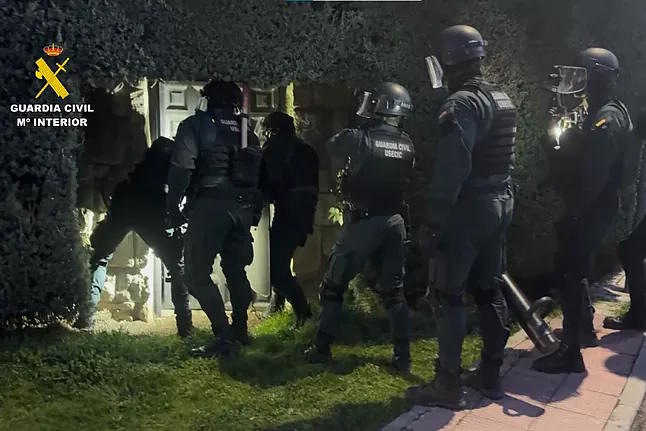A chalet in Madrid turned into a clandestine laboratory, international shipments disguised in speakers and lamps, and a criminal organization with connections on both sides of the Atlantic. This is how the investigation named Operation Ketauro concluded, with which the Civil Guard managed to dismantle a group dedicated to the production and export of "tusi," the well-known pink cocaine, from Madrid to New Jersey (United States).
The investigation began in 2024 when agents from the Fiscal and Borders Unit of Adolfo Suárez Madrid-Barajas Airport detected several suspicious packages. All followed the same pattern: international postal shipments of speakers and lamps, inside of which doses of "tusi" were hidden. The organization used false identities to hinder police work and avoid being traced.
The progress of the investigation allowed the researchers to identify the nine members of the group, led by a young man who directed and supervised the drug production. The "tusi" was manufactured in a chalet in Moralzarzal, where ketamine and MDMA were mixed, adding dye until achieving the characteristic pink hue. Once the substance was ready, other members were responsible for packaging and sending it to the United States, while a different residence served as a "nursery" to store the money from the illicit sales.
The operation had the collaboration of the Customs and Border Protection (C.B.P.) of the U.S. Department of Homeland Security, which allowed the detection of a constant flow of "tusi" shipments between Spain and the United States. Thanks to this cooperation, U.S. authorities carried out a controlled delivery in New Jersey, which led to the arrest of the package recipient.
During the searches carried out at the homes of those involved, in the chalet used as a laboratory, and in the residence used to hide the money, the agents seized a total of 4,650 grams of narcotics, mainly "tusi," as well as 20,000 euros in fractional currency. Two weapons were also confiscated, one firearm and one compressed air gun, which the organization kept to protect both the drugs and the money obtained from illegal activities.
The organization consisted of six men and three women, aged between 20 and 56 years old. They are all charged with crimes against public health, membership in a criminal group, and illegal possession of weapons.
